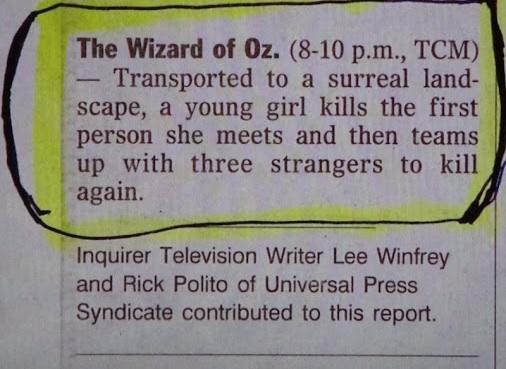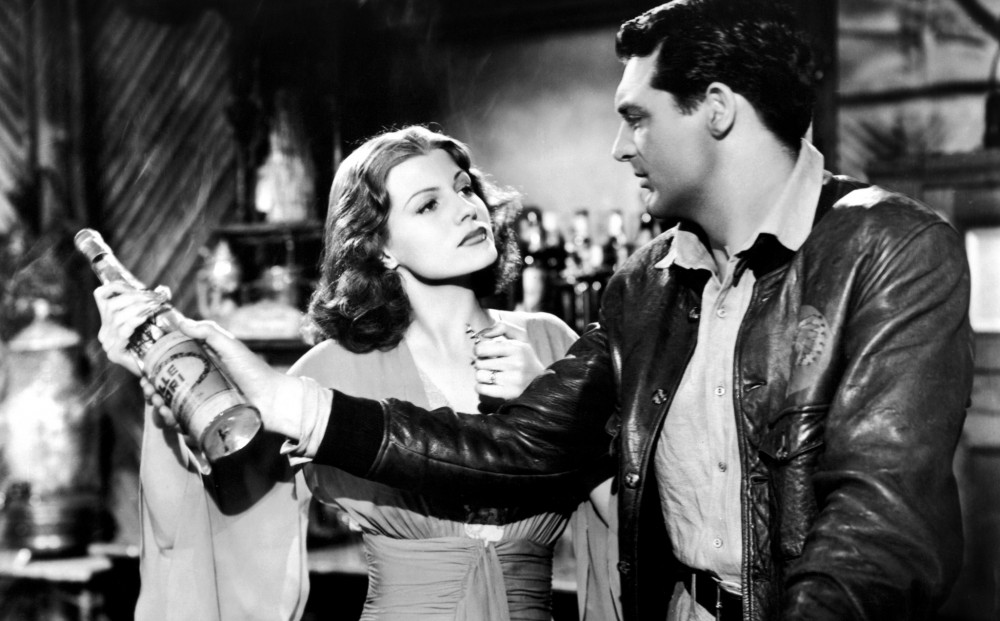my favorite movies of 1939:
(1) Mr. Smith Goes to Washington
(2) The Wizard of Oz
(5) The Women
favorite of 1939:
Mr. Smith Goes to Washington(James Stewart, Claude Rains, Jean Arthur, Edward Arnold, Thomas Mitchell. Directed by Frank Capra.)Stream Mr. Smith Goes to Washington on these sites.
2nd favorite of 1939:
(Judy Garland, Frank Morgan, Ray Bolger, Bert Lahr, Jack Haley, Margaret Hamilton, Billie Burke. Directed by Victor Fleming.)
The moment when Dorothy (Judy Garland) moves from her sepia-toned home in Kansas to the vibrant colors of Oz is a crucial dividing line — not just in this movie, but in all of film, essentially announcing a new way of making movies:
The dark side of The Wizard of Oz was captured in this newspaper listing (which has often been shared online without crediting the writer, Rick Polito):
Rotten Tomatoes sums up the critics’ consensus:
An absolute masterpiece whose groundbreaking visuals and deft storytelling are still every bit as resonant, The Wizard of Oz is a must-see film for young and old.
Ebert tapped into why this movie sticks with us as children, and why adults keep showing it to kids one generation after another:
Salman Rushdie, growing up in Bombay, remembers that seeing the film at 10 “made a writer of me.” Terry McMillan, as an African-American child in northern Michigan, “completely identified when no one had time to listen to Dorothy.” Rushdie wrote that the film’s “driving force is the inadequacy of adults, even of good adults, and how the weakness of grownups forces children to take control of their own destinies.” McMillan learned about courage, about “being afraid but doing whatever it was you set out to do anyway.” They’re touching on the key lesson of childhood, which is that someday the child will not be a child, that home will no longer exist, that adults will be no help because now the child is an adult and must face the challenges of life alone. But that you can ask friends to help you. And that even the Wizard of Oz is only human … . “The Wizard of Oz” has a wonderful surface of comedy and music, special effects and excitement, but we still watch it … because its underlying story penetrates straight to the deepest insecurities of childhood, stirs them and then reassures them. As adults, we love it because it reminds us of a journey we have taken. … [Dorothy’s] friends on the Yellow Brick Road (the Tin Man, the Scarecrow, the Cowardly Lion) were projections of every child’s secret fears. Are we real? Are we ugly and silly? Are we brave enough? In helping them, Dorothy was helping herself, just as an older child will overcome fears by acting brave before a younger one.
Stream The Wizard of Oz on HBO Max.
3rd favorite of 1939:
Gone with the Wind (Vivien Leigh, Clark Gable, Olivia de Havilland, Leslie Howard, Hattie McDaniel, Thomas Mitchell. Directed by Victor Fleming [uncredited directors: Sam Wood, George Cukor].)This is the longest movie on this blog.
Having heard about how this nearly four-hour movie is so problematic and racist (Washington Post link), I put off watching Gone with the Wind until recently. So how did I react when I finally saw it? Well, something like this:
😐🙂😳😲😱🙁😂😒😔🙂😂😢😖🤨😫😭🥺This Chicago Tribune review sums it up:
“Gone With the Wind” offers the kind of big, rich, opulent experience the movies are in a unique position to offer but seldom do. A sweeping historical epic, set in Atlanta and the Georgia countryside before, during and after the Civil War, the film follows four strong central characters — and dozens of memorable minor ones — through a series of crises and life-challenging moments. Those fictional but full-blooded people include Vivien Leigh’s saucy, self-obsessed, indomitable plantation belle Scarlett O’Hara, Clark Gable’s sexy, courageous rake-adventurer Rhett Butler, Leslie Howard’s aesthete Ashley Wilkes and Olivia de Havilland’s saintly Melanie Hamilton, with Hattie McDaniel’s earthy Mammy (like Leigh’s, an Oscar-winning performance) the most memorable of the gallery around them.One of this great but frustrating movie’s weaknesses is the lackluster performance by the out-of-place Leslie Howard, who, unlike Vivien Leigh, couldn’t manage to put aside his real-life British accent and commit to playing a Georgian. I agree with this BBC piece (“Gone with the Wind: Is it America’s strangest film?”):
The idea that anyone — let alone anyone as unconventional as Scarlett — would choose this wishy-washy character over … Rhett is absurd: the most preposterous aspect of a daringly, bewilderingly idiosyncratic film. After more than 75 years, we’re still mesmerised by Scarlett. We’re still tantalised by Scarlett and Rhett. But Scarlett and Ashley? Frankly, we don’t give a damn.If only he’d been played by Jimmy Stewart!
But I didn’t have the experience some have of losing interest in the later parts which have been criticized for turning the movie into a relatively conventional melodrama. I like the focus on personal relationships better than the earlier, more historical stretches about the ravages of war, which give the sense that the filmmakers were trying hard to make Gone with the Wind the most grandly important movie ever … while glossing over so much of what was important about that time in our history.
Stream Gone with the Wind on HBO Max.
4th favorite of 1939:
(Cary Grant, Jean Arthur, Thomas Mitchell, Rita Hayworth, Richard Barthelmess. Directed by Howard Hawks.)
Geoff (Cary Grant) is a pilot who runs a freight air service in a South American port town. From the beginning he comes off as a callous and reckless leader who’s willing to risk lives — but not his heart. Bonnie (Jean Arthur) hates what Geoff does but also hates herself for loving him.
Airplane stunts keep this movie exciting, and an unpredictable ensemble cast keeps you wondering where it’s all going. There’s the loyal, aging pilot who’s incongruously called “the Kid” (Thomas Mitchell); MacPherson, who the Kid can’t forgive for an act of cowardice that killed the Kid’s brother (Richard Barthelmess); and MacPherson’s wife, who has a history with Geoff (Rita Hayworth in her breakthrough role).
From Hollywood’s pivotal year of 1939, Only Angels Have Wings feels strongly connected to movie history, and not just other aviation movies. The romantic and psychological tension in a land of ex-pats would come back a few years later in Casablanca (my favorite movie of 1942). Howard Hawks directing a steely and macho Cary Grant shows us another side of him a year after Hawks directed Grant as a timid and addled paleontologist in Bringing Up Baby (my favorite of 1938). Rita Hayworth’s ambiguous role — you can’t pigeonhole her as a girl next door or femme fatale — leaves us wanting more and hints at her career-making title role in Gilda (one of my favorites of 1946). And the dangerous mission to deliver nitroglycerin foreshadows the influential 1953 French movie The Wages of Fear.
For all the male-dominated daredevil scenes in Only Angels Have Wings, we really see things through Jean Arthur’s eyes. Her Bonnie character is the one who most clearly sees through the insane world in which she’s found herself, even when she’s a willing part of it.
Why does Only Angels Have Wings still resonate today? Not because of how cruel anyone in it is. This isn’t a stock battle of good vs. evil. The point is to watch what happens to people when occupational duty replaces ethical sensitivity, and workers bet their lives just to belong on the team. If this movie has a villain, it isn’t one person but the whole system they all feel stuck in.Stream Only Angels Have Wings on the Criterion Channel (with bonus features).
5th favorite of 1939:
(Norma Shearer, Joan Crawford, Rosalind Russell, Joan Fontaine, Paulette Goddard. Directed by George Cukor.)
Razor-sharp wit and deftly deployed innuendos coexist with tender feelings and crushing heartbreak in this ensemble comedy about women … and men … though you won’t see any of the latter in this movie! Yes, The Women has no male cast members but over 100 actresses, including Norma Shearer as a disillusioned wife/mother who’s the most complex character, Joan Crawford as a devious perfume saleswoman, Joan Fontaine as a pure-hearted but constrained young bride, Paulette Goddard injecting some mischief into the proceedings, and Rosalind Russell stealing the show as sardonically as possible.In this scene, Sylvia (Rosalind Russell) goes up to the saleswoman, Crystal (Joan Crawford), secretly knowing that Crystal is having an affair with Stephen Haines, the husband of Sylvia’s friend Mary Haines (Norma Shearer, who isn’t in this scene):
The Women isn’t seen as very feminist or progressive by our standards, but there’s enough insight amid the snappy banter to keep this movie fresh and resonant today. And the specific plot is transcended by the unspoken yet bold statement implicit in the very decision to make this movie 100% female.
Stream The Women on Tubi (free with ads) or these sites.
6th favorite of 1939:
Wuthering Heights(Laurence Olivier, Merle Oberon. Directed by William Wyler.)Stream Wuthering Heights on Amazon Prime (it left but will likely come back), Tubi (free with ads), or these sites.
7th favorite of 1939:
Destry Rides Again(James Stewart, Marlene Dietrich, Brian Donlevy. Directed by George Marshall.) Criterion recently put out a blu-ray with a beautiful restoration of this “comedic western,” which is “both a boisterous spoof and a shining example of its genre.” In one of the Criterion extras, critic Imogen Sara Smith observes:Destry Rides Again is both gender-bending and genre-bending, because it plays with expectations for male and female behavior in one of the genres in which gender tends to be the most traditionally defined.
Stream Destry Rides Again on these sites.
So I’ve included Jimmy Stewart and Cary Grant movies on this list. When someone asked what distinguished those two actors from each other, this was my response:
Cary Grant was more suave, bold, self-assured. Jimmy Stewart was more hesitant, introverted, and imperfect. If Grant had more charm, Stewart had more depth.
They both excelled at comedy and drama. But Grant in particular was a natural at comedy — he seemed like he couldn’t help being funny. Even when Stewart was in a comedy, he brought a serious undertone.
Grant was classically masculine. Stewart was ahead of his time in having a soft, sensitive quality back when most male actors lacked such nuance.
They might have been equally great as stars. But Jimmy Stewart was the greatest male actor of his time.
(Click here for the full list of my favorite movie(s) of each year from 1920 to 2020.)










.jpg)



Comments
Post a Comment
Thanks for submitting a comment on my movie blog! 🎬 Your comment won’t show up here right away. 😐 To make sure your comment gets seen, I recommend sharing this post on social media and saying whatever you feel like! 🤓